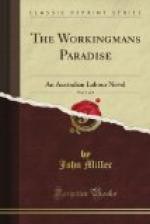“My father was a bent-shouldered hopeless man, when I recollect him. He got six shillings a week then, with a jug of cider every day. When he stopped from the wet, and there was no work in the barns, his wages were stopped. So he worked in the wet very often, for it generally rains in England, you know. The wet came through our roof. Gives the natives such pretty pink skins, eh, Geisner?” and he laughed shortly. “My father got rheumatism, and used to keep us awake groaning at nights. He had been a good-looking young fellow, my old granny used to say. I never saw him good-looking. In the winter we always had poor relief. We should have starved if we hadn’t. My father got up at four and came home after dark. My mother used to go weeding and gleaning. I went to scare crows when I was five years old. All the same, we were a family of paupers. Proud to be an Englishman, Geisner! Be an English pauper, and then try!”
“You’ll never get to the priests, Ford, if you start an argument,” interposed Mrs. Stratton.
“I’ll get to them all right. Our cottage was down a narrow, muddy lane. On one side of the lane was a row of miserable stone hovels, just like ours. On the other was a great stone wall that seemed to me, then, to be about a hundred feet high. I suppose it was about twenty feet. You could just see the tops of trees the other side. Some had branches lopped short to prevent them coming over the wall. At the corner of the highway our lane ran to was a great iron gate, all about it towering trees, directly inside a mound of shrub-covered rockery that prevented anybody getting a peep further. The carriage drive took a turn round this rockery and disappeared. Once, when the gate was open and nobody about, I got a peep by sneaking round this rockery like a little thief. There was a beautiful lawn and clumps of flowers, and a summer house and a conservatory, and a big grey-fronted mansion. I thought heaven must be something like that. It made me radical.”
“How do you mean?” asked Mrs. Stratton.




